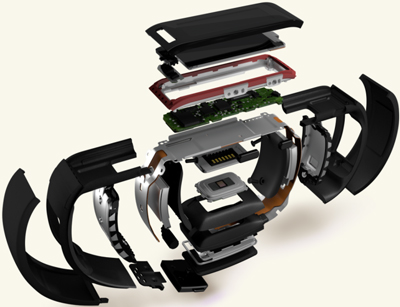News
Microsoft Launches Cloud-Based Health Platform and Fitness Band
- By Kurt Mackie
- October 31, 2014
Microsoft on Wednesday took the wraps off a wearable technology product called "Microsoft Band," as well as a new cloud-enabled health platform to support apps and devices.
The Microsoft Health software platform collects user data, such as a user's heart rate from exercise, and stores it in "a secure location" via the cloud, according to Microsoft's announcement. The platform contains algorithms for physiologic sensors and various calculations, such as reporting the intensity of a workout or the restfulness of one's sleep cycle.
Apps leveraging the Microsoft Health platform are available this week for consumers using Android, iOS or Windows Phone devices, Microsoft announced.
Microsoft also launched the Microsoft Band, a watch-like device with 10 sensors that will track a person's heart rate, calories burned and sleep quality. It includes the ability to tap workout programs from "Gold's Gym, Shape, Men's Fitness and Muscle & Fitness." Microsoft Band also connects with smartphones, as well as Microsoft's Cortana personal assistant program. It delivers alerts about arriving calls, texts or e-mails, as well as workout information. The idea is that users might wear Microsoft Band 24 hours a day, and not just during workouts.
Priced at $199, Microsoft Band is currently available in limited quantities in the U.S. market, as well as at MicrosoftStore.com.
 Exploded view of Microsoft Band health sensor product. Source: Microsoft.
Exploded view of Microsoft Band health sensor product. Source: Microsoft.
The Microsoft Health platform has room for partnering companies. It currently works with solutions from "UP by Jawbone, MapMyFitness, MyFitnessPal and RunKeeper," according to Microsoft's announcement. Microsoft is licensing its 10 sensor modules as part of the platform. It also provides its app, APIs and cloud storage service to partners, as well as access to Microsoft Health algorithms and machine learning via the platform's Intelligence Engine.
In the near future, Microsoft conceives of connecting its Health platform with its HealthVault solution, which is software that's used to share medical information with health service providers. The platform is also conceived as becoming "smarter" over time via the Intelligence Engine, such that it may be able to suggest performance improvements for individuals.
Microsoft also has notions of connecting Health platform data with Microsoft Office e-mail and calendar solutions, as well as integrating location-based information into the service, according to a Microsoft-published article on the topic. The article even suggests that Microsoft's platform will be capable of recording a person's exhilaration and stress levels.
About the Author
Kurt Mackie is senior news producer for 1105 Media's Converge360 group.